Running Supplements For Marathon Runners
All the info on gels, tabs, beetroot juice and anything else that can make running 42.2km easier

Even for regular runners, training for a marathon is a steep learning curve. While running a few times a week and tearing it up at your local parkrun every Saturday doesn’t involve too much thought beyond what gear to wear, covering the long distances required to prep for a 26.2 mile race means considering how to avoid injury, how to fit in and vary all the running you need to do and, lastly but by no means least-ly, how you fuel your body for all that exercise.
Most, if not all, of your fueling should be done through your diet, and our marathon training diet advice and guide to what to eat when marathon training will help you do just that. But there are times when eating real food just isn’t possible or desirable—one of those times being the race itself—and that’s where supplements can help.
The main supplements to consider are sports drinks and running gels that top up your carb reserves and electrolytes during long runs, and ones that help you restock and help the body recover during an arduous training schedule. There are also supplements like beetroot juice and caffeine that can help to boost your performance. In short, there are loads of different supplements you can use to help you body cope with the demands of marathon training. Here are the top types you’ll come across.
Running Gels
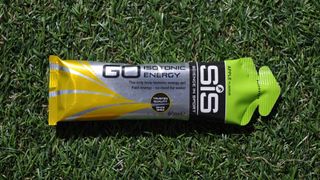
Probably the most common marathon training supplement, the best running gels are scoffed by runners during long runs (anything over 90 minutes) to replenish their carb stocks. In the marathon itself, you’ll probably go through at least four or five gels depending on how fast you’re expecting to run it. It’s vital to make sure you’ve already tried the ones you use in the race, because gels can be hard on the digestive system.
Many races will hand out gels on the course too, so it’s worth checking to see what kind they are so you can try them in training. Then on race day you can pick up a gel or two on the way and not have to carry all your gels from the start.
Sports Drinks
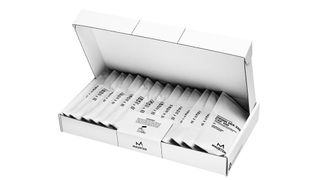
The best sports drinks can either be a carb-only drink, or a combo of carbs and electrolytes. They are great for fueling long runs because drinks often contain more carbs than gels, and are sometimes easier for the body to take in without upsetting the stomach. The downside is drinks are harder to carry with you, so usually people use them before big runs and their race to ensure their carb stores are completely full before switching to gels during the race.
That said, if you have a set of the best running shorts with a lot of pockets for storage, it’s possible to carry drinks with you—I’ve carried my own drinks for my past 10 marathons because I prefer them to gels during the race.
Electrolyte Tabs
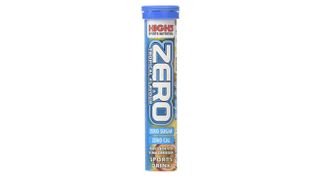
Pop one of the best hydration tabs in water and they dissolve quickly to create an electrolyte-rich cocktail, containing minerals like sodium, potassium and magnesium, which help your body to hydrate itself. Carb gels generally don’t have electrolytes, which you need to replenish when you exercise for a long period and sweat a lot. Having the tab with you means you can just grab water on the course of the race and create your own electrolyte drink, and they’re handy for marathon training in warm conditions too.
Beetroot Juice
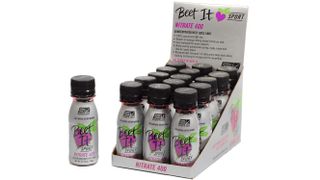
Research into the nitrates found in foods like beetroot, spinach and rocket suggests they can have a positive effect on performance in endurance activities. You can get beetroot supplements such as Beet It shots which contain 400mg of dietary nitrate—try drinking them daily in the week before your event as well as having a couple in the 12 hours beforehand. This is definitely something to practice before race week though, because concentrated beetroot juice is something your body will need to get used to.
Recovery Drinks
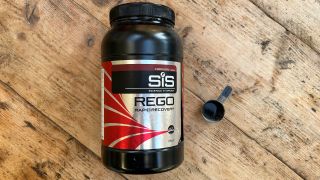
When weightlifters finish a workout they reach for a protein shake—but while runners need protein too, it’s more important to replenish carbs and electrolytes. If you’re undertaking a loaded training schedule and don’t have time or the inclination to do this through meals, one of the best recovery protein powders, which contains carbs, protein and electrolytes, is useful to have on hand.
Multivitamin Tabs
You can get all the vitamins and minerals you need to support your body during hectic training schedules from your diet, but a multivitamin can be a helpful insurance policy, and starting the day with a multivitamin tab dissolved in a pint of water is no bad thing for your hydration as well.
Caffeine
We don’t mean chugging down a coffee before running, mainly because that’s a gastrointestinal risk only the foolhardy would take, but getting versions of the above supplements that contain caffeine can provide a timely boost. Save a running gel or electrolyte drink with added caffeine for kilometre 30 of your marathon—it might be just what your body and brain need to spur you on to the finish line.
Energy Bars
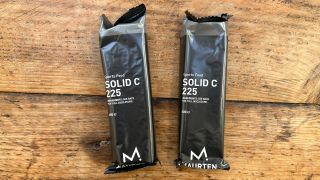
They’re harder to consume on the go than a sports drink or gel, but the best energy bars generally have the advantage of being far tastier and less likely to ruffle any gastrointestinal feathers. If you’re running an ultramarathon or taking part in any kind of event where you stop to refuel, energy bars are a great choice. They also make for a great pre-race snack.
Sweets
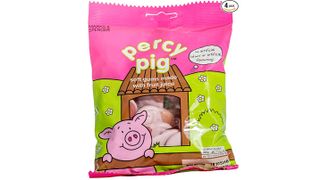
Yes, you read that right. If all of the above sounds a little too serious for you, then you can just opt for some of your favourite jelly sweets to fuel your running. It’ll be cheaper and tastier, though do be aware that it's harder to chew some sweets when running than slurping an energy gel.
The nutritional number to look out for with sweets is the amount of carbs they contain. Percy Pigs are very strong on this front, containing almost 7g of carbs per pig, while jelly babies offer 5g of carb per baby. Isn’t it nice to talk about the high amount of sugar in those sweets in a positive way? However, both Percy Pigs and jelly babies can become a little less appetising if kept in a sweaty running belt during your marathon, so also consider jelly beans, because they have a hard shell that can keep them fresher for longer on the run. The own brand beans at your local supermarket will be cheap—it’s what I opt for.
Get the Coach Newsletter
Sign up for workout ideas, training advice, reviews of the latest gear and more.

Nick Harris-Fry is a journalist who has been covering health and fitness since 2015. Nick is an avid runner, covering 70-110km a week, which gives him ample opportunity to test a wide range of running shoes and running gear. He is also the chief tester for fitness trackers and running watches, treadmills and exercise bikes, and workout headphones.
